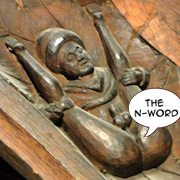|
Looking for books on the history of the catholic church , preferably post Byzantine empire but 500-1200 is ok too
|
|
|
|

|
| # ? Apr 19, 2024 00:19 |
|
Epicurius posted:One good book about the Aral Sea in particular is "Pipe Dreams: Water and Empire in Central Asia's Aral Sea Basin", which is a look at how both the Tsarist and Communist government put their faith in things like large scale irrigation projects as a way to legitimize colonialism in Central Asia through this idea that they were "developing" and "civilizing" the region. This is the only book I know of on the subject (I'm not as well-read in Soviet history as in imperial stuff) and I haven't read it myself but it was well received when it came out a few years ago.
|
|
|
|
Is there a historian forum or central area to see what historians think of books? i.e. it was well received by who?
|
|
|
|
StrixNebulosa posted:Is there a historian forum or central area to see what historians think of books? i.e. it was well received by who? Reviewers, mostly. I can walk you through my general pattern of checking book reception. The simplest and most straightforward thing to do is to look up the book and see who the publisher got jacket quotes from. In this case (Maya K. Peterson, Pipe Dreams) they are: quote:'Pipe Dreams is a thoroughly researched, engagingly written, and highly original contribution to Central Asian and environmental history. Maya K. Peterson tells a story of technology, water politics, and imperial hubris that will be familiar to those who have studied water politics in the American West.' Now this doesn't mean much to a non-specialist. But this is my field and I know some of these people, personally and/or professionally and/or by reputation. Nicholas Breyfogle is a well-known cultural and environmental historian of the Russian Empire who writes good books that are widely read in the field. Adeeb Khalid is probably the foremost scholar of Imperial Russian and Soviet Central Asia working today. Patryk Reid is a young guy who got his PhD recently and is writing a book about Soviet Central Asian environmental history. This is a diverse group of high-calibre scholars (some mid-career, some well established, some young and new) and they're all giving it extremely high praise about how it's a fantastic book. Now that being said, this is direct from the publisher, so these are the reviews they want you to read so you buy the book. If you want a more detailed look, you can go to academic journal reviews, where the reviewer's quote isn't being used to sell the book but rather to evaluate it for their colleagues. If I do that for this book, I find that top journals in the field, like Slavic Review and Russian Review and Environmental History, first of all chose to review the book, which means they think it's important, and second of all published very positive reviews about how it's a well-researched and interesting book that makes a significant contribution to the field. Here's the kind of conclusion those reviews offer: Brian Bonhomme in Russian Review posted:So little is there to fault in this study that I will save my only critical remark for whomever it was chose to print the book on paper so thin that the reader is sometimes distracted by print bleed-through. If I haven't read a book myself and none of my friends or colleagues in the field have mentioned that book to me, that's how I usually assess the reception of a book. vyelkin fucked around with this message at 01:32 on Jan 25, 2021 |
|
|
|
How should someone evaluate it if they aren't in the field, and so don't know enough about the people giving quotes to evaluate them, and don't have access to journals to check for reviews (or even an idea of what the good journals to check are)?
|
|
|
|
Anfauglir posted:How should someone evaluate it if they aren't in the field, and so don't know enough about the people giving quotes to evaluate them, and don't have access to journals to check for reviews (or even an idea of what the good journals to check are)? That is trickier. Academic works don't usually get reviews in newspapers or magazines, the ones that do get reviews aren't necessarily the best ones, and reviews of historical works in those venues aren't always reliable (they're often written by non-specialists who don't have the knowledge needed to know whether or not the author is talking out of their rear end). One resource that is out there but that I don't personally use very often is H-Net Reviews, which is a mostly-scholarly online resource with a level of standards and academic editing higher than you would expect from a free review service. You can look at reviews within networks on specific subjects, or search for specific works if you're looking for a particular review. It's going to be more hit and miss than top academic journals would be, but it's still a good resource. Worth noting, some fields are more active than others on H-Net. I've heard H-Net France, for example, is extremely active and it's as important to publish a review there as it is to publish it in a top journal, while H-Net Russia is less of a central forum for my field. Also, these days with the internet it's, let's say, much easier than it used to be to bypass academic paywalls and get around the predatory for-profit nature of academic publishing to access books, journal articles, and reviews. If you want to check out the publisher quotes method, even if you've never heard of the people you can always search for the names of the people providing the quotes to see who they are. Most academics have a CV somewhere on the internet, whether through their department website or a social network like academia.edu. These CVs are often out of date, but searching for the people providing the quotes and reading a bit about them can give you a sense of where they're working, what they work on, how much they've published and in what venues, and so on. If you look up the quote provider and they're a professor at an R1 institution who's published three university press books and ten peer-reviewed articles on related subjects, it's not a guarantee but they're probably a decent judge of the book they're giving a quote for. That said, there are lots of unemployed and underemployed academics out there so someone not having published a lot on something or not being at an R1 doesn't mean they don't know what they're talking about. e: oh, another option if you're willing to spend a little money, often there are professional organizations that offer graduated membership rates and publish review-focused journals. The two big ones in my field are the American Historical Association (AHA), which publishes the American Historical Review, and the Association for Slavic, East European, and Eurasian Studies (ASEEES), which publishes Slavic Review--but there will be other associations depending on someone's particular interests. Depending on your income or professional status, you can often join these associations for like $50-200 a year, which gets you access to a bunch of stuff including the journals of those associations, which publish high-level scholarly research but are also heavily review-focused. I get physical copies of Slavic Review in the mail four times a year from my membership in ASEEES, and I regularly read through a lot of the reviews in it to keep up with new works in my field, since every issue features dozens or even hundreds of reviews of new books. I have access to this journal through my university as well, but I would get the journal by joining ASEEES even if I wasn't an academic. That's certainly not an option for everyone, but if you're really into history and are willing to pay a bit of money to keep up with the academic side of it, it is an option that's out there. vyelkin fucked around with this message at 03:49 on Jan 25, 2021 |
|
|
|
I personally like H-Net. My advisor in undergrad was a contributor and editor for his field.
|
|
|
|
Minenfeld! posted:I personally like H-Net. My advisor in undergrad was a contributor and editor for his field. Can you give a run-down on exactly what the hell it is? It's a nightmare to navigate through. I'm assuming it's not a forum right?
|
|
|
|
 Currently reading this; very good so far.
|
|
|
|
Currently reading Europe's Tragedy by Peter H. Wilson, and I'm starting to realize I may have bit off more than I can chew in terms of Thirty Years' War history books. I normally read things that are more social history, and this is granular to the point of confusion. I'm about a third of the way in and I still don't understand how the Holy Roman Empire's system of governance works. Any recs for something a bit more focused or easier to read?
|
|
|
|
Pinball posted:Currently reading Europe's Tragedy by Peter H. Wilson, and I'm starting to realize I may have bit off more than I can chew in terms of Thirty Years' War history books. I normally read things that are more social history, and this is granular to the point of confusion. I'm about a third of the way in and I still don't understand how the Holy Roman Empire's system of governance works. Any recs for something a bit more focused or easier to read? I played a lot of Europa Universalis and even then this book was very heavy.
|
|
|
|
Yea I'm actually reading that too, coincidentally enough, and am about a hundred pages in. It's a bit dry and the war hasn't even begun yet. It also says something that the liveliest the author has gotten was during his description of the soldier's kits, like you know he's one of those guys. As for the HRE, no one has ever understood how it worked.
|
|
|
|
CV Wedgwood's book on the 30 years war is really good. Its probably out of date in some respects, but it was a really great read.
|
|
|
|
vyelkin, sorry for being late, but thank you SO much for those informative posts.
|
|
|
|
StrixNebulosa posted:vyelkin, sorry for being late, but thank you SO much for those informative posts. It's no problem, I'm glad to offer what I know about the field!
|
|
|
|
I fear I am asking for an impossible thing here, but: Had a conversation with my 7th grader who was annoyed that her social studies class still acts like Africa is still all huts and Masai tribes, which made me realize that I know gently caress all about sub-saharan Africa except it got colonized and then there were a bunch of proxy wars after WWII. Has anyone written a good survey of African history, ideally pre-19th century? Or even an African version of "Looking East From Indian Country?" I fear such a thing doesn't exist because its such a massive topic with tons of tribal and ethnic histories intertwined.
|
|
|
|
i dont know the title of the book but it was about how loving dumb and broken the confederate government was in the civil war and how most of them were weird liberterians and one like duled a bunch of people over petty poo poo. any ideas?
|
|
|
|
Dapper_Swindler posted:i dont know the title of the book but it was about how loving dumb and broken the confederate government was in the civil war and how most of them were weird liberterians and one like duled a bunch of people over petty poo poo. any ideas? What level does it look at? National government? State government? Local government? National-State relations?
|
|
|
|
Battle Cry of Freedom had at least one section on the Confederate Congress being dysfunctional, but that's probably not what you're looking for.
|
|
|
|
Comedy option: The Rise and Fall of the Confederate Government
|
|
|
|
stealie72 posted:I fear I am asking for an impossible thing here, but: It's not quite the time period you specified but general books I assign for my Modern Africa course are Roland Oliver and Anthony Atmore's "Africa since 1800" and Hakim Adi and Marika Sherwood's "Pan-African History: Political figures from Africa and the Diaspora since 1787" Dapper_Swindler posted:i dont know the title of the book but it was about how loving dumb and broken the confederate government was in the civil war and how most of them were weird liberterians and one like duled a bunch of people over petty poo poo. any ideas? Are you thinking of "Confederate Reckoning: Power and Politics in the Civil War South"?
|
|
|
|
Chairman Capone posted:It's not quite the time period you specified but general books I assign for my Modern Africa course are Roland Oliver and Anthony Atmore's "Africa since 1800" and Hakim Adi and Marika Sherwood's "Pan-African History: Political figures from Africa and the Diaspora since 1787" I recently finished Confederate Reckoning and while it was very good i dont think its what the author is thinking of.
|
|
|
|
Shelby Foote delves into the general dysfunction and ineptitude of the Confederate government but it's peppered throughout his entire 3000-page narrative history of the Civil War. But he goes into detail about idiot Confederate congressmen like Henry S. Foote (no relation to the author, as far as I know), the runaway inflation and worthless "shin-plaster" Confederate currency, the bread riots, all the states' rights hardliners threatening to secede from the Confederacy once it was becoming obvious the war was un-winnable, and all the failed attempts Confederate ambassadors made in England and France for official recognition of the Confederacy as an independent country.
MeatwadIsGod fucked around with this message at 21:22 on Jan 30, 2021 |
|
|
|
[quote="Chairman Capone" post="512115167"] It's not quite the time period you specified but general books I assign for my Modern Africa course are Roland Oliver and Anthony Atmore's "Africa since 1800" and Hakim Adi and Marika Sherwood's "Pan-African History: Political figures from Africa and the Diaspora since 1787" Oliver & Atmore also have a book called Medieval Africa 1250-1800 that covers precolonial Africa. It's a short book on a big topic so I'm sure there are more in depth books out there but as an introduction it's alright.
|
|
|
|
I've always wanted to read Shelby Foote's stuff but I'm worried if I do, seriously, that I'll come away arguing that the civil war was about States Rights or something.
|
|
|
|
stereobreadsticks posted:[quote="Chairman Capone" post="512115167"] Thanks to both of you. Its somewhere for me to start.
|
|
|
|
algebra testes posted:I've always wanted to read Shelby Foote's stuff but I'm worried if I do, seriously, that I'll come away arguing that the civil war was about States Rights or something. Foote wasn't exactly a Lost Cause proponent, but he was writing in the 50s and 60s. Historiography of the time was transitioning from Lost Cause to a more civil-rights-focused interpretation of the war, and Foote was very much part of that movement. He's out of date now, but it's still a good read if you have the time to get through 3,000 pages of narrative.
|
|
|
|
dublish posted:Foote wasn't exactly a Lost Cause proponent, but he was writing in the 50s and 60s. Historiography of the time was transitioning from Lost Cause to a more civil-rights-focused interpretation of the war, and Foote was very much part of that movement. He's out of date now, but it's still a good read if you have the time to get through 3,000 pages of narrative. Yeah, I'd agree with this. If you want to learn more about the Civil War I'd start with a history of slavery and American politics of the 1840s-50s because Foote only deals with it very tangentially. Foote is still great as a military historian/dramatist, but he omits or delays a lot of crucial things about the Confederacy. The Cornerstone Speech, for instance, isn't mentioned until about 2600 pages into the book. And Foote's coverage of the Fort Pillow massacre is downright misleading. He clearly idolized Nathan Bedford Forrest which is one of the worst things about his history.
|
|
|
|
Throwing out a rec for Joanne Freeman's The Field of Blood for a look at Congress in the 1840s-50s and the influence of "the Slave Power".
|
|
|
|
algebra testes posted:I've always wanted to read Shelby Foote's stuff but I'm worried if I do, seriously, that I'll come away arguing that the civil war was about States Rights or something. Foote's 3 volume series has been part of my rotation of way too many audiobooks I have for my daily commute. I'm nearing the end of the 2nd volume and I don't think he's that bad, even if he can be a little to glowing towards Confederate generals he finds dashing or clever. The quality of the narrative writing is worth a few eyerolling sections like that.
|
|
|
|
For context I watched the raw interview from Ken Burn's doc and Ken kept saying "So how about Slavery as the cause of the war huh?" And Foote was very elusive and kinda got me spooked to his attitude.
|
|
|
|
There's a segment on Foote from a recent LRB article that I think is worth quoting at length:Alex Abramovich posted:In October 2017, two months after white supremacists held their ‘Unite the Right’ rally in Charlottesville, Virginia, Donald Trump’s (then) chief of staff, John Kelly, went on Fox News and delivered a history lesson. ‘The lack of an ability to compromise led to the Civil War,’ he said. ‘Men and women of good faith on both sides made their stand where their conscience had them make their stand.’ Kelly’s comments echoed the president’s remarks in the rally’s immediate aftermath. (‘Some very fine people on both sides,’ Trump said, comparing the marchers – who carried torches and chanted ‘Jews will not replace us’ – with those who had come out to protest against their presence.) In many quarters Kelly was taken to task. But when Trump’s (then) press secretary, Sarah Huckabee Sanders, was asked about it, she concurred. ‘I don’t know that I’m going to get into debating the Civil War,’ she said. ‘But I do know that many historians, including Shelby Foote, in Ken Burns’s famous Civil War documentary, agree that a failure to compromise was a cause of the Civil War.’ I'm not personally familiar with Foote's books and it's not my field, but I would read his work very critically.
|
|
|
|
A Savage War is a military history of the American Civil War and also probably the best management book I have ever read.
|
|
|
|
I still have people I know, that are around my age, argue the States’ Rights angle (I live in Tennessee). My response is always, “But what state right exactly? Hmm, what could it be?”
|
|
|
|
I mean you only have to look at the Secession Declarations written by states like SC, VA, and TX before the war and it's very obvious the reasons for secession are primarily the Republican president-elect (Lincoln) who was "hostile to slavery" and free states not adhering to the Fugitive Slave Act. Foote's big deficiencies are that he mentions these things in passing or omits them entirely. It's why I would never recommend him as a starting point to learn about the Civil War, its causes, etc. The other thing that irritated me more and more throughout his history was this bourgeois sensibility with respect to property getting destroyed or expropriated. He goes into stuff like Sherman's army burning their way to Meridian for dozens of pages but never mentions the conditions at Andersonville prison, for example. So as a military historian he's incredibly detailed and great at dramatizing battles in a moment-to-moment way, but the sense of proportion is all off. When the Union burns railways or depots it's presented with maximum effrontery but a lot of the border massacres by Confederate guerillas only get a cursory mention. So tl,dr start with Joanne Freeman or Edward Baptist so you have the proper context before reading Foote.
|
|
|
|
stealie72 posted:Thanks to both of you. Its somewhere for me to start. Completely forgot this, but another you should check out: "The Golden Rhinoceros: Histories of the African Middle Ages" by François-Xavier Fauvelle. Again, a very general overview of the continent over a wide span of time, but I thought it was very well done. Also, David Northrup's "Seven Myths of Africa in World History" and "Africa's Discovery of Europe: 1450-1850" I would also give high marks to. The second is probably closer to what you're looking for, but the first is also useful for answering general questions about how Africa is depicted in popular culture.
|
|
|
|
Well the cult of reasonable bipartisan compromise is just American liberalism. Compromise wasn't possible, because slavers had irreconcilable material interests with the opposition, and that's something you can't just hash out with reasonable political debate in the Free Market of Ideas™.
|
|
|
|
Mantis42 posted:Well the cult of reasonable bipartisan compromise is just American liberalism. Compromise wasn't possible, because slavers had irreconcilable material interests with the opposition, and that's something you can't just hash out with reasonable political debate in the Free Market of Ideas™. This is why I think Baptist's The Half has Never Been Told is a pretty good starting point for the period. You see all the Slave Power maneuverings to keep their grip on power in Congress and states like SC were holding preliminary conferences to secede as early as 1850 if the Compromise didn't pass. The only possible outcomes were war or more decades' worth of acquiescence to the Slave Power, which would have meant expansion of slavery westward and probably further south into Mexico and Central America as more expansionist wars would have created new slave territories and continued the feedback loop of power for the slave-owning aristocracy.
|
|
|
|
Epicurius posted:What level does it look at? National government? State government? Local government? National-State relations? national i believe. i have to go back to my old community college library and try to find it. Chairman Capone posted:
i dont believe so. it was more about how the government was run by liberterian assholes who dueled each other and davis micromanaged in the wrong places and how it was all chud hypocrits. i think the title had Dxie in it. MeatwadIsGod posted:This is why I think Baptist's The Half has Never Been Told is a pretty good starting point for the period. You see all the Slave Power maneuverings to keep their grip on power in Congress and states like SC were holding preliminary conferences to secede as early as 1850 if the Compromise didn't pass. The only possible outcomes were war or more decades' worth of acquiescence to the Slave Power, which would have meant expansion of slavery westward and probably further south into Mexico and Central America as more expansionist wars would have created new slave territories and continued the feedback loop of power for the slave-owning aristocracy. yeah. the war was always gonna happen because the Slave powers were always prepared to start it, they were just able to get lucky or bullshit power enough that it go kicked back a generation.
|
|
|
|

|
| # ? Apr 19, 2024 00:19 |
|
dublish posted:Foote wasn't exactly a Lost Cause proponent, but he was writing in the 50s and 60s. Historiography of the time was transitioning from Lost Cause to a more civil-rights-focused interpretation of the war, and Foote was very much part of that movement. He's out of date now, but it's still a good read if you have the time to get through 3,000 pages of narrative. Interview in the Paris Review posted:INTERVIEWER This isn't some we-can't-judge-from-this-historical-distance thing. The first volume of The Civil War: A Narrative was published in 1958. So I guess if you really want to hand-wring your way into exculpating his veneration of the Confederacy you might be able to scratch out some "man of his times" nonsense there. The second volume was published 1963, in the midst of the Civil Rights Movement. And the third volume wasn't published until 1974. And then he became a minor celebrity in the '90s after the Burns documentary. And his views do not appear to have evolved in the near four decades between when the first volume was published and when he blithely announced he'd take up arms for the Confederacy if the opportunity were to present itself. "The Confederates fought for some substantially good things." Any time you have trouble figuring out what to think of Shelby loving Foote, just meditate on the fact that he said that in 1997 after devoting literally decades to Civil War history.
|
|
|





















 \
\









